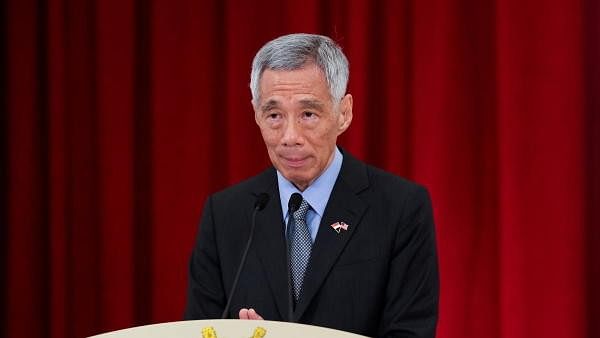
Singapore Prime Minister Lee Hsien Loong.
Credit: Reuters Photo
By Karishma Vaswani
Singapore Prime Minister Lee Hsien Loong’s decision to step down after 19 years and hand power to deputy Lawrence Wong on May 15 was expected — though, perhaps, not so soon. Most political analysts had been eyeing an end-of-year handover, to ensure more time for Wong to study and shadow the role, ahead of general elections that must be called by November 2025.
Wong — who is currently both deputy prime minister and minister of finance — will need a combination of fresh ideas, wisdom and experience as he writes the island’s next chapter. The world that confronts it is far more precarious than at any other time in the nation’s history, except for the upheaval caused by Singapore’s decision to break away from Malaysia in 1965.
The global landscape was then, as it is today, dangerous and uncertain. The Cold War between the US and the Soviet Union was at its peak. A nuclear missile crisis was just barely averted and much of what we call the Global South today had just emerged from the ugly grip of colonialism.
Singapore, a tiny dot at the bottom of the Malayan peninsula, with no natural resources and a largely illiterate and unskilled workforce, was about to find out what it meant to strike out alone as an independent nation, without the benefit of a vast hinterland.
The first prime minister and founding father, Lee Kuan Yew, famously cried on national television when he made the announcement of the island’s separation from its neighbor, because of the difficult path he knew lay ahead. Such tears are unlikely this time around, but the small nation is entering uncharted waters yet again and Wong’s ability to navigate will be a key gauge of his leadership.
The new prime minister will have to deal with an increasingly acrimonious relationship between the US and China. Singapore has consistently said it wants to be friends with all and enemies of none, and this has helped the city-state go from a developing economy to Asia’s richest country. It has benefited from decades of globalization, a world where borders were erased and goods and services flowed freely, lifting incomes and stock market valuations.
As Beijing has cracked down on pro-democracy activists in Hong Kong and imposed harsh security laws, foreign companies and talent have sought haven in Singapore. The city-state will need to manage relations between Washington and Beijing delicately, even as it seeks to calm tensions and soothe nerves on both sides.
That won’t be easy. The handover comes at a time when the US’s legitimacy has taken a hit in the Global South over the Biden administration’s handling of the Israel-Hamas conflict. It has become a key focal point, not just for Asia’s Muslims in places like Indonesia and Malaysia, where the majority of citizens follow Islam, but also for citizens in Singapore who sympathize with Palestinians and have condemned the human suffering. A recent survey conducted by the ASEAN Studies Centre at ISEAS – Yusof Ishak Institute in Singapore, showed that more than half of the Southeast Asians asked would now prefer to align with China over the US if forced to choose between the rivals, reversing last year’s trends.
So as Wong steps up to the seat of power, it is best he gets all the help he can. Singapore’s leadership succession is a carefully telegraphed event that’s been years in the making. Even though the 51-year-old is known to be sincere and hardworking, that won’t be enough to get him out of tricky diplomatic tussles. A clear political vision is missing, says Ian Chong, non-resident scholar at Carnegie China and a political scientist at the National University of Singapore. “We know the hobbies of the new prime minister, but we don’t know what he has planned for the country,” he told me. “It’s a bit strange that the person taking over, and has had ample time to lay out a path, has yet to do so. Perhaps what that tells is you that no one in the government knows yet.” Wong’s guitar skills have made him a favorite on social media, but are unlikely to come in that handy as he takes on the top job.
It is not clear yet whether Lee, like his father before him, will serve as a minister mentor in Wong’s cabinet. It would certainly be useful to have his knowledge and expertise, as well as the relationships he has built as a global statesman of more than two decades. But the new prime minister should also be ready to listen to fresh ideas, not just from his own overwhelmingly dominant People’s Action Party, but also from the opposition, including leaders like lawyer and author Pritam Singh, who have proposed novel ways to address pressing domestic issues like the income gap, as well as gender disparities in the workplace.
These are not insurmountable challenges, but they require a deftness in managing both foreign policy and the domestic agenda. Singapore has always managed to stand out as the little country that could. The new leader has big shoes to fill.